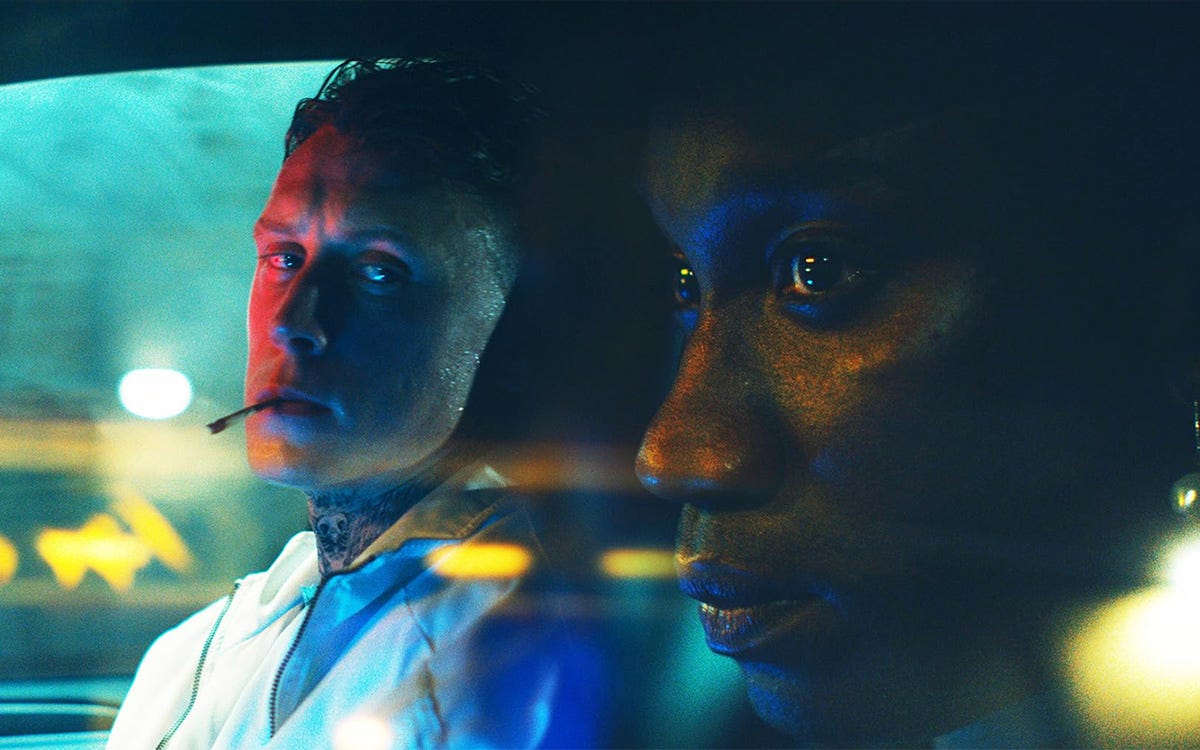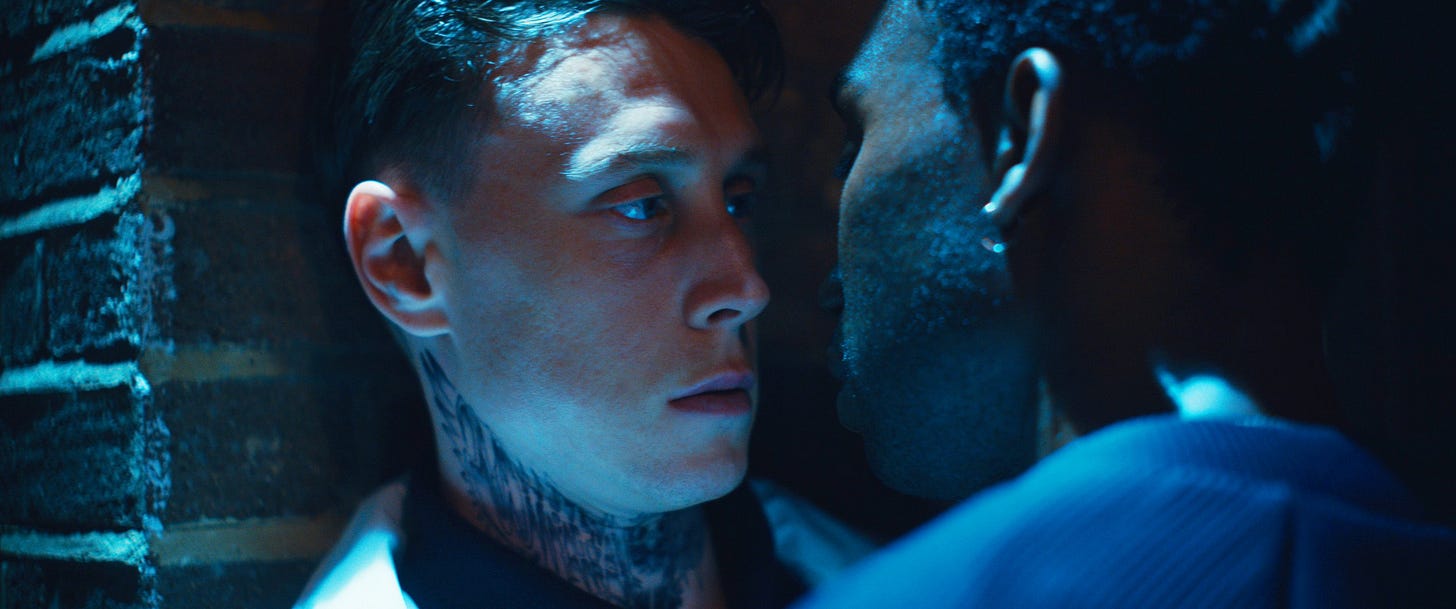Revenge is set in motion: Jules re-attracts Preston, who’s forgotten their first encounter
Femme (2023)
Streaming on Disney+/Hulu
Rent or buy on Amazon Prime Video
This is a startling, darkly inward-turning tale of two strangers at a crossroads, one openly gay, the other deeply closeted. It asks hard questions about sexual identity. Their heart-rending, sometimes brutal contest for control makes for a breathtaking watch.
Jules (Nathan Stewart-Jarrett) is a Black drag performer in a gay London nightclub. He’s a star attraction, and in his headlining rendition of Aphrodite, Greek goddess of love and lust, he commands the stage in full pagan regalia.
He floats like a temptress — radiant and carnal at the same time — in a wide, floor-length royal blue gown with tightly braided locks flowing down his back like beckoning serpents.
In person Jules comes off milder, even sweet, but his brightly inquisitive eyes suggest he’s not to be trifled with. Before that night’s performance, out on the street, we’ve seen him briefly lock eyes with Preston (George MacKay), a nervous, tattooed white bloke who stares back fascinated and repulsed.
After the show, Jules drops in at a convenience store. He’s now in street drag, heavily made up, in a short skirt and a wig woven in braided, frosted locks he flings coquettishly. Into the store come Preston and his mates, ruffians who gigglingly sling homophobic slurs at Jules.
Preston joins in, calling Jules a “faggot”. Jules shoots back: “Takes one to know one”, and out loud reminds Preston they’d exchanged looks before the performance. What’s more, Jules stingingly points out, Preston seems to be unlikely to provide satisfying sex. Preston’s mates ask him if he’s going to stand for this humiliating putdown.
Infuriated, Preston and his mates follow Jules into the street and give him a savage beating. Preston puts his personal finish on the attack by demanding Jules remove his clothes, leaving him badly wounded, nearly naked and covered in blood.
This terrifying assault hits Jules harder than he could have imagined when he’d mocked Preston a few minutes before. Over the next three months his stunned reaction slowly transforms to a smoldering urge to strike back.
For all the script’s twists that caught me off guard, this particular turn I saw coming.
I’ve gotten to know a few drag queens over the years. They weren’t performers like Jules, just gay men who extended their sexual expression into publicly adopting female dress and manner. I wasn’t one of them, but somehow, they trusted me enough to open up about their lives and aspirations.
“Femme” hotly reminds us that the struggle for openness continues. I don’t know of another LGBTQ+ movie that so ardently worries about the inner consequences of deep-seated social lies.
They shared a telling trait with Jules, which added immensely to this movie’s fascination for me. I learned that men in drag aren’t challenging other men, gay or straight, to fully accept them as “women”. Indeed, they enjoy watching other men struggle to figure them out.
The come-hither they’re actually proposing is for both straight men and “regular” gay men to ask themselves whether they need to feel completely estranged from drag queens.
It’s true that “queens”, as they love to be called, delight in being brazenly, even outrageously, “femme”; at the same time, though, they find it sorrowful, even tragic, that “masculine” men fear not them, exactly, but closeness.
That pushing away makes them not just sad but resentful. Since they intend no harm, why are they spat upon, shunned, menaced? And why in heaven’s name should they accept the affront?
To fight back — absolutely not having it — is the gauntlet drag queens throw down. And unsurprisingly they’re disappointed or angered when cowardly men refuse to pick it up and treat them decently.
Specifically, they well understand that sex, or even non-physical affection, can lead to what in my opinion has most covertly frightened men in all of civilization’s history: tenderness. Between men. I was beyond gratified to see the exquisitely shot and lit Femme helping to make my case.
MacKay and Stewart-Jarrett’s taut performances keep us asking: Who’s controlling who?
Preston, though he’s slow to recognize it, feels this strange, phantom tenderness creeping up on him, and he counter punches with a chilling “toxic masculine” force. His desperation is both mesmerizing and scary.
In the three months following the brutal attack, a still deeply shaken Jules has stopped performing and barely leaves the roomy dwelling he shares with his friends.
One night, dressed totally out of drag, he nervously, shakily goes to a gay sauna and sees Preston, who doesn’t recognize him. Feeling an attraction, Preston propositions Jules coldly, all but indifferently, and as they drive off in Preston’s BMW, Jules has already begun to hatch his plan for revenge.
In what follows, our expectations are upended. Jules seems nothing like an avenger. He remains passive and compliant, even – especially – when he’s abused, and allows Preston to penetrate him hard, fast and meanly, completely ruling out affection. Actually, of course, slick Jules is playing for time.
Despite himself, Preston begins to show traces of kindliness and even admiration for Jules. When he catches Jules surreptitiously filming one of their couplings, he hurls the phone away in fury. But shortly afterward he calms down and offers to replace it.
A small-scale drug dealer and a budding clothing entrepreneur, Preston before long is treating Jules to expensive dinners, and they begin to share jokes, quiet moments, and eventually blissful sleep curled next to each other after sex.
But Jules’ itch for payback refuses to die. He desperately wants Preston to learn that the man he’s now begun to care for is the same person he beat to a pulp. If that means yanking Preston out of the closet for his mates to learn who he really is, so be it.
And the two now have to ask whether growing affection – they share brief, shy kisses when no one’s looking – can continue in secret, without anyone discovering how deep their caring for one another has become.
MacKay as the cruel yet possibly reachable Preston is alarmingly physical and threatening. He makes Preston oddly appealing in his frantic denial. Preston’s wary, enraged, then suddenly warm, laughing eyes keep Jules on edge.
With good reason. Preston’s explosiveness is the nearest pathway to his feelings. Harsh and brusque as they mostly are, we sense better angels in him straining to rise to the surface.
But there’s no getting around Preston’s deeply ingrained panic, and MacKay trying to keep a lid on his bewilderment makes for a spellbinding, scarily volatile performance.
Stewart-Jarrett is heartbreaking yet coolly strategic as Jules, a man so practiced in double appearance that he’s stunned into withdrawal when simply refusing to take verbal abuse gets him brutally assaulted offstage.
Under the wigs, makeup and billowy costumes, how much respect as a man does he actually command? And what, with the fresh kindness he now sees in Preston’s eyes, will exacting revenge gain him?
This gifted actor’s underplayed, painfully baffled portrayal keeps us wanting the best for Jules, while wondering if, in or out of makeup, he knows what’s best for himself.
At drag shows I’ve attended over the years, more than one MC has launched the night’s entertainment with the wry greeting: Good evening ladies and gentlemen, and those who aren’t sure. That sweet jest always got a warm chuckle, including from straights in the audience.
But happily, its bubbly indeterminacy has fallen away and drag has now entered squarely into society’s debates about free sexual expression.
Working from their own script, directors Sam H. Freeman and Ng Choon Ping, in their feature filmmaking debut, have dug deeply into today’s trembling, tectonic bedrock of sexual identity in flux.
Power goes two ways: How long has tough guy Preston been wanting Jules to take charge?
Fear of being one thing, while working to be seen as something else, doesn’t just apply to drag queens. It can also leave both gay and straight men too frightened to explore attraction, sexual or not, and the honest affection that could be waiting underneath it.
I believe such paralyzing reluctance is a moral, personal and societal calamity. Aching human need is being crushed by dread and shame. These moviemakers have tried to shine light on this dark conundrum.
Femme hotly reminds us that the struggle for openness continues. I don’t know of another LGBTQ+ movie that so ardently worries about the inner consequences of deep-seated social gutlessness.
This overexcited vigilance against sexual fluidity — which Preston acutely suffers from — gives drag its push-pull power. You never quite “believe” it, but the sheer bravado under the sometimes slightly awkward dresses and less than perfectly applied wigs and makeup can beguile or unsettle you anyway.
The drag queens I came to know personally weren’t performers. They held ordinary day jobs and much of the time dressed in a nominally “masculine” manner. But they had flair, and after work hours they emerged publicly in drag, buoyantly giving off a distinctly female charge.
So does Jules here, placing himself in unforeseen danger. Like him, the drag queens I’ve known refused to bend to pressure to be “just a guy”. They believed there was more to them than that. And in evenings on the street or in bars, they supercharged the risk that underlies all flirtatiousness.
The moment one laid eyes on them, their demeanor and carriage said, Take me or leave me. The same challenge will face audiences who watch Femme.






